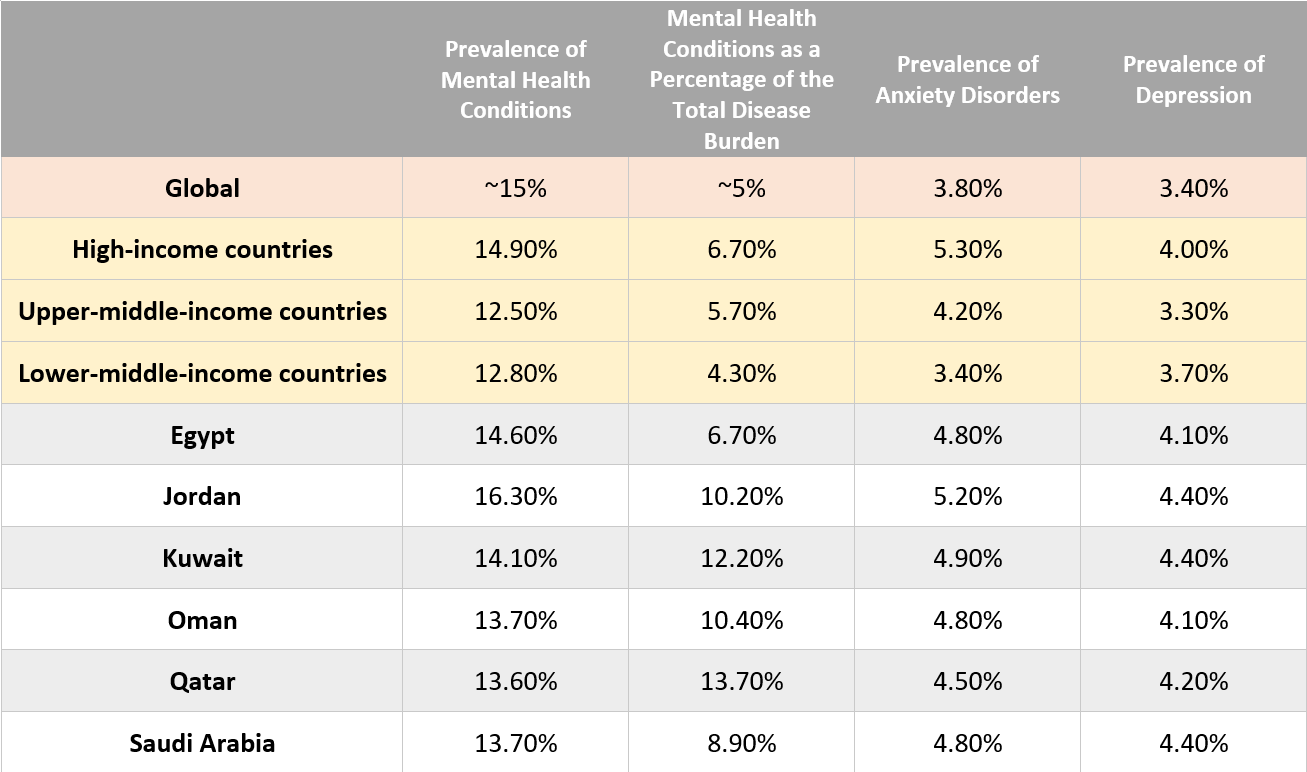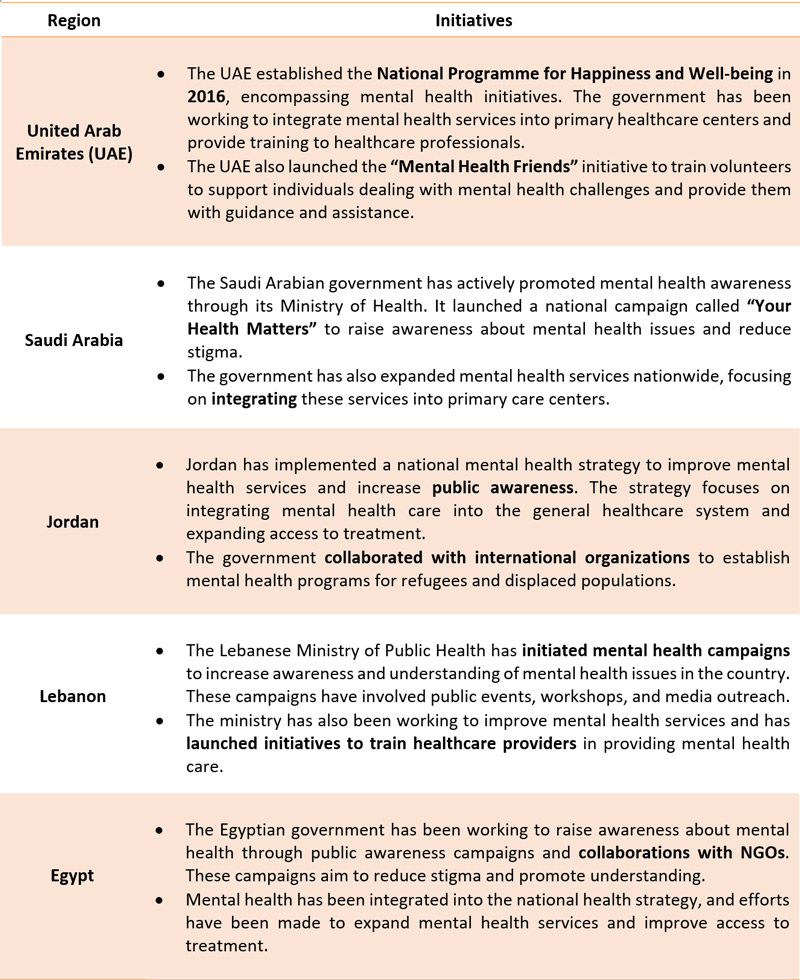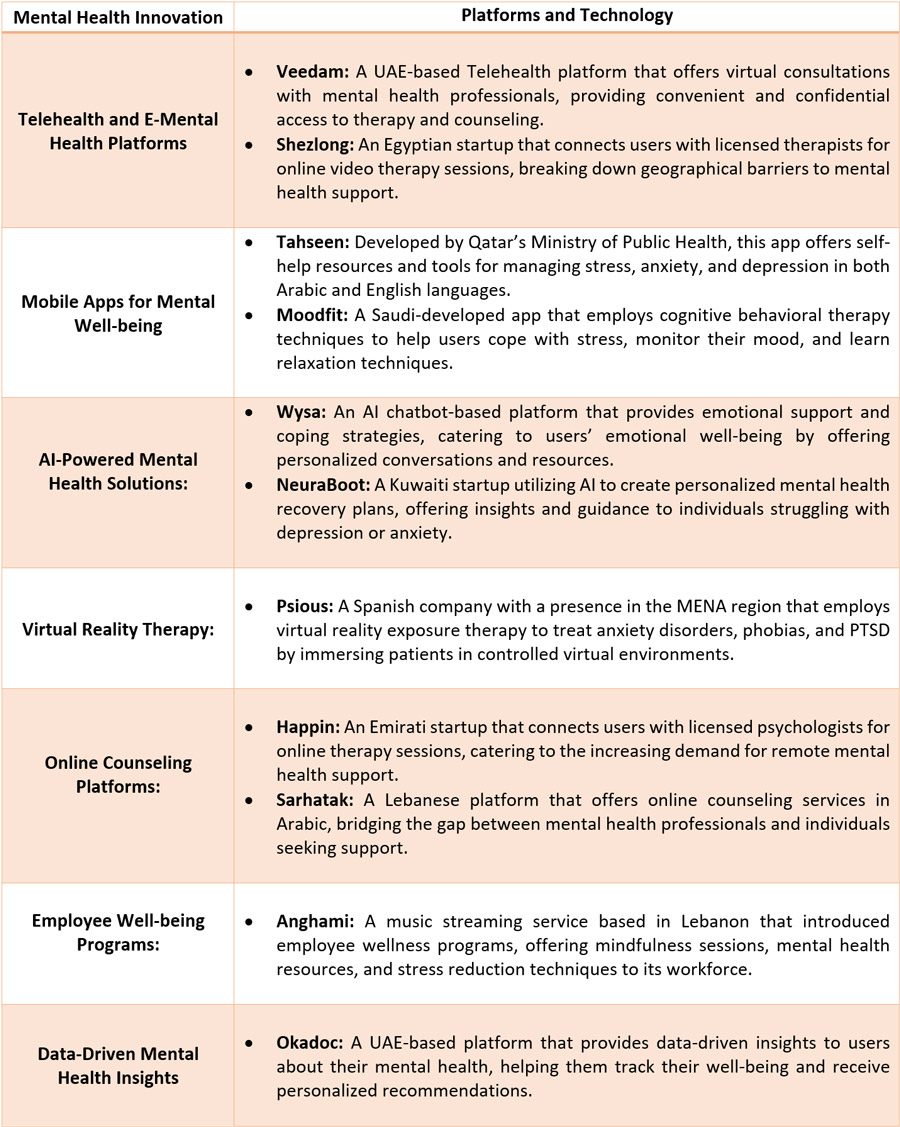DATE
September 26, 2023
CATEGORY
Blog
SHARE

The Middle East and North Africa (MENA) region has been a cradle of civilization for millennia with its rich tapestry of cultures, histories, and landscapes. From the enchanting bazaars of Marrakech to the ancient pyramids of Giza, the region captivates with its charm and allure. Yet, beneath the surface of this mesmerizing realm lies an often-overlooked and formidable challenge – the burden of mental illness. This silent epidemic affects millions of lives across the region, transcending borders, languages, and traditions.
Amidst the vibrant hues of bustling cities and the tranquil serenity of desert oases, many individuals silently endure the weight of mental health issues. Anxiety, depression, post-traumatic stress disorder (PTSD), and other mental health disorders cast a shadow over the lives of countless people, young and old.
One of the most significant barriers to addressing mental health in the MENA region is the prevailing stigma that shrouds discussions around mental illness. Deep-rooted cultural norms often discourage open dialogue, leading many to suffer in silence rather than seeking the help they desperately need. Moreover, the pervasive stigma attached to mental health conditions can isolate individuals from their communities, perpetuating the cycle of suffering and exacerbating the effects of mental illness.
Compounding this issue is the scarcity of accessible and comprehensive mental health services. Limited mental health infrastructure, a shortage of trained professionals, and financial constraints can impede access to timely and adequate care. Moreover, cultural norms and traditional beliefs may lead some to rely on informal support systems rather than seeking formal treatment, further exacerbating the burden of mental illness.
Socioeconomic factors also play a pivotal role in shaping the mental health landscape in the MENA region. High poverty, unemployment, and limited access to education and healthcare contribute to the stress and strain experienced by individuals and families, elevating the risk of mental health issues.
As the region undergoes rapid transformations and grapples with numerous challenges, the burden of mental illness can no longer be ignored. We must break the silence surrounding mental health, challenge stigma, and foster an environment of compassion and understanding. By destigmatizing mental health issues, we can encourage individuals to seek help without fear of judgment and facilitate early intervention and support.
The Burden of Mental Illness in the MENA Region
The MENA region faces a significant burden of mental illness, with prevalence rates on the rise. The stigma surrounding mental health issues often leads to underreporting and inadequate treatment. Challenges such as armed conflicts, displacement, and socioeconomic disparities further exacerbate the situation. Limited access to mental health services and a shortage of trained professionals contribute to the unmet needs of individuals grappling with conditions like depression, anxiety, and post-traumatic stress disorder. As the region strives for better awareness and resources, addressing the complex interplay of cultural factors, social dynamics, and healthcare infrastructure remains crucial in alleviating the burden of mental illness.
According to 2019 data from The Institute for Health Metrics and Evaluation (IHME), the prevalence of mental health conditions ranges between 13.6% in Qatar and 16.2% in Jordan. Although the prevalence of mental health conditions has remained relatively consistent over the past two decades, mental health conditions have increased significantly as a share of the total disease burden. For high-income countries worldwide, a category into which Kuwait, Oman, Qatar, and Saudi Arabia fall, the average is 15%. Jordan and Egypt, with respective averages of 16.2% and 14.5%, are slightly higher than the average for their respective income groups. Although overall prevalence rates of mental health conditions appear on par or even slightly low compared with the global average in some countries, locally reported figures are often higher. A national survey of 22,000 families in Egypt by the country’s Ministry of Health in 2018 indicated that 25% of Egyptians suffer from mental health issues.
The Burden of Mental Illness in the MENA Region, 2019

(Source: IHME, Global Burden of Disease 2019)
Prevalence of Depression in the Middle East and the Contributing Factors
The Arab World is facing greater problems of depression than the rest of the World. The unique challenges faced by this region make it the most repressive region in the world, some of which are discussed as follows:
- Stigmatization: Stigmatization of any mental health condition worsens the problem. In a society where mental health problem is associated with shame, disgrace, and disrespect and is considered taboo, people hesitate to talk about their mental health problems and are less likely to seek medical and psychological help. Internalizing the problems increases mental stress, leading to clinical depression and suicide.
- Lack of mental health awareness and psychological help: Despite increasing mental health awareness worldwide, the Arab World still lacks it. The Arab World has an Islamic culture, where mental health is mostly linked with religion. People are encouraged to deal with their mental health issues by maintaining a good relationship with God, being involved in religious activities, and not discussing their problems with others due to the influence of culture. Limited professional psychological help is provided, but due to cultural and religious beliefs, most people keep their issues to themselves and do not seek professional help, resulting in higher levels of depression in the region.
Apart from these factors, many others contribute to the development of depression, including:
- Increase usage of cell (mobile) phones and less social interaction: Today, teenagers and adults are increasingly using cell phones. This leads to decreased social interaction, which may lead to isolation. Excessive usage and late-night wakefulness cause insomnia, poor concentration, laziness, and fatigue. These all are contributing factors to depression.
- Lack of physical activity: Due to increased technology, people spend much of their time in their homes, and thus, there is physical inactivity. Even in the work environment, many people conduct their work while seated. A lack of physical activity causes fatigue, contributing to depression.
Rising Awareness and Advocacy of Mental Health in the MENA Region
In recent times, a notable transformation has been underway in the Middle East and North Africa (MENA) region – a transformation that extends beyond the economic and political spheres. A rising tide of awareness and advocacy for mental health has steadily gained momentum, reshaping societal attitudes and policy priorities. As societies in the MENA region navigate the challenges of modernization and globalization, recognizing mental health’s significance has become a pivotal aspect of holistic well-being. Governments, organizations, and communities increasingly acknowledge the need to confront stigma, expand resources, and foster open conversations around mental health. This evolving landscape reflects a profound shift in how mental health is perceived, addressed, and integrated into the fabric of MENA societies, with far-reaching implications for individuals and collective prosperity.
In the dynamic landscape of the MENA region, governments have embarked on a series of initiatives to prioritize mental health. Recognizing its crucial role in overall well-being, these governments proactively address the need for greater awareness and support. Through diverse programs and policies, the region’s authorities emphasize the significance of mental health in individual lives and within the broader societal context. By taking these steps, governments are challenging the stigma associated with mental health and fostering an environment where its importance is acknowledged and integrated into the fabric of public health agendas.
Initiatives by the Government for Mental Health Awareness

(Source: UAE Government)
Innovations in Mental Healthcare in the MENA Region with Examples of Technology and Companies Involved
Over the past few years, there has been a notable rise in creative methodologies aimed at advancing mental healthcare in the MENA region. This surge is attributed to the fusion of technology and cooperative efforts with progressive companies, ushering in a transformation in how mental health is understood and addressed across the region.
In recent years, the Middle East and North Africa (MENA) region has experienced a wave of innovations in mental healthcare. These innovations are reshaping how mental health challenges are addressed, breaking down barriers, and enhancing support for individuals facing such issues. One notable innovation is technology integration, which has led to the development of telehealth platforms and mobile applications tailored to mental health needs. These platforms allow individuals to access therapy sessions, counseling, and self-help resources from the comfort of their homes, overcoming geographical constraints and reducing the stigma associated with seeking help.
Additionally, cultural sensitivity has become a focal point of innovation, with mental health programs being adapted to resonate with the region’s diverse cultural norms and languages. This approach acknowledges the importance of cultural context in addressing mental health issues and promotes more inclusive and effective support. Also, collaborations between mental health professionals and technology companies have given rise to AI-driven solutions. Chatbots and virtual assistants provide immediate support, offer coping strategies, and direct users to appropriate resources. These innovations not only provide accessible and timely assistance but also contribute to early intervention and prevention.
Furthermore, community-based initiatives have gained traction, utilizing trained community members and volunteers to promote mental health awareness and provide support. By creating safe spaces for open discussions, these initiatives foster a sense of belonging and encourage individuals to seek help without fear of judgment.
The MENA region’s commitment to workplace mental health is another driving force behind innovation. Companies are implementing employee well-being programs that offer stress management workshops, mental health resources, and support networks. This acknowledges the impact of work-related stress on mental health and emphasizes a holistic approach to employee welfare. MENA region is witnessing a transformation in mental healthcare through technological advancements, cultural adaptation, community involvement, and workplace support. These innovations collectively contribute to breaking down barriers, raising awareness, and providing accessible and effective mental health care to individuals across the region.
Innovative Approaches to Mental Healthcare in the MENA Region

(Source: UAE Government)
Conclusion
In conclusion, the journey toward improved mental health in the MENA region is a multifaceted endeavor marked by progress, challenges, and a growing commitment to positive change. Efforts to break stigmas surrounding mental health have gained momentum, sparking crucial conversations and fostering understanding. As societies increasingly recognize the importance of mental well-being, individuals find the courage to seek help and support, defying long-standing taboos. The region is witnessing a transformative shift in how mental health is perceived and addressed through government initiatives, community-driven programs, and innovative technological solutions. While obstacles persist, the resilience and determination exhibited by individuals, healthcare professionals, and advocates indicate a promising path toward a future where mental health is not only prioritized but embraced as an integral part of overall well-being.
Source: Delveinsight http://www.delveinsight.com/






